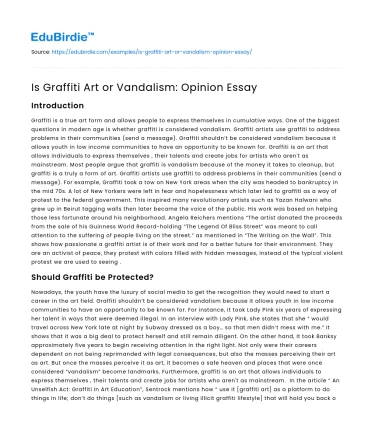Introduction
Graffiti is a true art form and allows people to express themselves in cumulative ways. One of the biggest questions in modern age is whether graffiti is considered vandalism. Graffiti artists use graffiti to address problems in their communities (send a message). Graffiti shouldn’t be considered vandalism because it allows youth in low income communities to have an opportunity to be known for. Graffiti is an art that allows individuals to express themselves , their talents and create jobs for artists who aren't as mainstream. Most people argue that graffiti is vandalism because of the money it takes to cleanup, but graffiti is a truly a form of art.
Graffiti artists use graffiti to address problems in their communities (send a message). For example, Graffiti took a tow on New York areas when the city was headed to bankruptcy in the mid 70s. A lot of New Yorkers were left in fear and hopelessness which later led to graffiti as a way of protest to the federal government. This inspired many revolutionary artists such as Yazan Halwani who grew up in Beirut tagging walls then later became the voice of the public. His work was based on helping those less fortunate around his neighborhood. Angela Reichers mentions “The artist donated the proceeds from the sale of his Guinness World Record-holding “The Legend Of Bliss Street” was meant to call attention to the suffering of people living on the street.” as mentioned in “The Writing on the Wall”. This shows how passionate a graffiti artist is of their work and for a better future for their environment. They are an activist of peace, they protest with colors filled with hidden messages, instead of the typical violent protest we are used to seeing .
Save your time!
We can take care of your essay
- Proper editing and formatting
- Free revision, title page, and bibliography
- Flexible prices and money-back guarantee
Should Graffiti be Protected?
Nowadays, the youth have the luxury of social media to get the recognition they would need to start a career in the art field. Graffiti shouldn’t be considered vandalism because it allows youth in low income communities to have an opportunity to be known for. For instance, it took Lady Pink six years of expressing her talent in ways that were deemed illegal. In an interview with Lady Pink, she states that she “ would travel across New York late at night by Subway dressed as a boy… so that men didn’t mess with me.” It shows that it was a big deal to protect herself and still remain diligent. On the other hand, It took Banksy approximately five years to begin receiving attention in the right light. Not only were their careers dependent on not being reprimanded with legal consequences, but also the masses perceiving their art as art. But once the masses perceive it as art, it becomes a safe heaven and places that were once considered “vandalism” become landmarks.
Furthermore, graffiti is an art that allows individuals to express themselves , their talents and create jobs for artists who aren't as mainstream. In the article “ An Unselfish Act: Graffiti In Art Education”, Sentrock mentions how “ use it [graffiti art] as a platform to do things in life; don’t do things [such as vandalism or living illicit graffiti lifestyle] that will hold you back or condone you.” He wants us as a community to start using graffiti as an expression of art instead of the typical graffiti that is used for tagging or gang related. This way, graffiti creates a deeper meaning for itself. People can look at a wall and admire it’s beautiful structures while also understanding the artist's meaning behind the art. We have to take a different approach in educating the youth the differences in graffiti and graffiti art. The style of graffiti is cherished among those who want to express themselves and their talents, but many of these people become discouraged knowing that graffiti can lead to trouble. By educating our youth, they become influenced into viewing the art aspect of graffiti.
The main concern of the opposing side is whether graffiti would be considered vandalism if done on one’s property. To eradicate this concern, Communities can be funded private areas for graffiti artists to express their art. This private area would significantly decrease the amount of graffiti on private properties. In addition schools can be funded to properly train a graffiti artist willing to comply with regulations. Critics say graffiti is a threat and indicator of violent communities, in conclusion, graffiti should be decriminalised, as it is a form of not only cultural expression, but art.






 Stuck on your essay?
Stuck on your essay?

